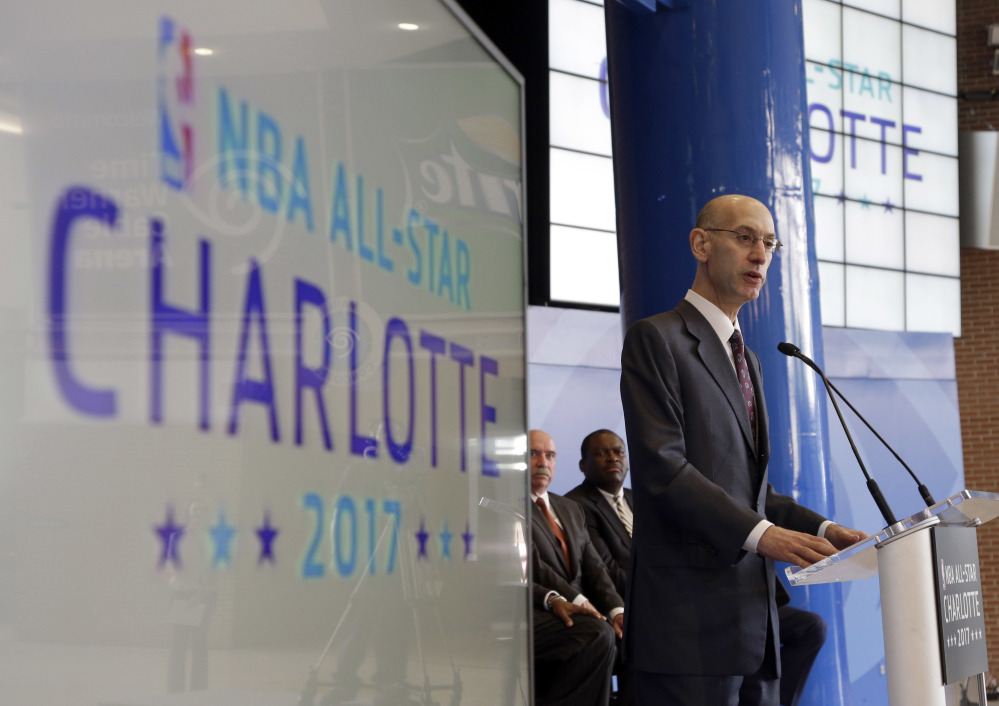The NBA announced Thursday it will move its 2017 All-Star Game from Charlotte because of North Carolina’s law that bars local governments from extending civil rights protections to gay and transgender people.
“The NBA has decided to relocate the 2017 All-Star Game from Charlotte with the hope of rescheduling for 2019,” the league said in a prepared statement.
“While we recognize that the NBA cannot choose the law in every city, state, and country in which we do business, we do not believe we can successfully host our All-Star festivities in Charlotte in the climate created by HB2,” as the law is commonly known.
The league said no decision has been made over where the game will be played but one will be announced in the coming weeks. The website The Vertical, which first reported the NBA’s decision, said it likely would be held in New Orleans. Chicago, New York and Las Vegas also were considered, people close to the league’s thinking said earlier this week.
The NBA’s decision is the latest fallout for North Carolina from the controversial law, which has been widely criticized as discriminatory. The law, which was passed in March, requires transgender individuals to use public restrooms that correspond with the sex listed on their birth certificates.
In April, Bruce Springsteen canceled a concert in Greensboro. Pearl Jam, Ringo Starr and Boston likewise have canceled shows, while Cirque du Soleil bypassed two scheduled performances. PayPal canceled plans to open a new payment center in Charlotte, while Deutsche Bank did away with plans to expand its operations in Cary, costing the state an estimated 650 jobs. Since April more than 120 companies have called for a repeal of the law, as PepsiCo, American Airlines and Wells Fargo have all raised concerns.
The University of Albany also canceled a game at Duke University in Durham in November because of the executive order by New York Gov. Andrew Cuomo banning publicly funded, non-essential travel to North Carolina.
“It’s an embarrassing bill,” Mike Krzyzewski, head coach of Duke and the U.S. men’s Olympic basketball team, told USA Today after Wednesday’s Olympic team practice. He said he stood by that statement Thursday, adding “Our state has lost a lot.”
The NBA has applied pressure to the state to change the law since it was passed. After league Commissioner Adam Silver expressed his disappointment with the state legislature’s decision last month to make only small changes to the bill, a change of venue for the All-Star game seemed to be the only likely outcome.
“We were frankly hoping that they would make some steps towards modifying the legislation,” Silver said, “and, frankly, I was disappointed that they didn’t.”
After an initial statement in March in which the league said it was “deeply concerned” about the law, Silver said in April that if the law didn’t change the game would have to move. “We’ve been, I think, crystal clear, that a change in the law is necessary to play in the kind of environment that we think is appropriate for a celebratory NBA event,” he said. “But that we did have some time and if the view of the people who were allied with us, in terms of a change, the view of the people on the ground in North Carolina was that the situation would best be served by us not setting a deadline, then we would not set a deadline at this time.”
The league’s decision will undoubtedly be a blow to the Charlotte Hornets, which are owned by NBA legend Michael Jordan. The franchise had gained some momentum over the past 12 months: it was awarded the All-Star game, made it back to the playoffs for the second time in three seasons and, this month, retained prominent free agents Nicolas Batum and Marvin Williams. Now, instead of celebrating the game returning to the city for the first time since 1991, the Hornets will watch it be played elsewhere.
“We understand the NBA’s decision and the challenges around holding the NBA All-Star Game in Charlotte this season,” the team said in a statement. “There was an exhaustive effort from all parties to keep the event in Charlotte, and we are disappointed we were unable to do so.”
Transgender and gay rights supporters praised the NBA’s decision.
“The NBA is taking an important stand against North Carolina’s unconstitutional and discriminatory HB2,” Heidi Hess, senior campaign manager for the social change organization CREDO, said in a statement. “This is further evidence that hate and bigotry are bad for business.”
Tweeting his support was Jason Collins, a retired NBA player who became the first publicly gay athlete to play for a major American sport after coming out in 2013. “As a member of the NBA family and as a gay man, I’m extremely proud to see the NBA take initiative and move the All-Star Game from North Carolina,” Collins said.
Send questions/comments to the editors.



Success. Please wait for the page to reload. If the page does not reload within 5 seconds, please refresh the page.
Enter your email and password to access comments.
Hi, to comment on stories you must . This profile is in addition to your subscription and website login.
Already have a commenting profile? .
Invalid username/password.
Please check your email to confirm and complete your registration.
Only subscribers are eligible to post comments. Please subscribe or login first for digital access. Here’s why.
Use the form below to reset your password. When you've submitted your account email, we will send an email with a reset code.